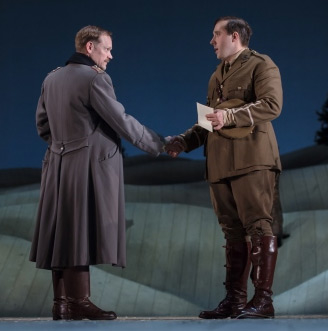The Christmas Truce (Royal Shakespeare Company)
Erica Whyman directs Phil Porter’s new family play inspired by real events of exactly 100 years ago

© Topher McGrillis
The Royal Shakespeare Company has delivered some remarkable family shows in recent years – Matilda, The Heart of Robin Hood and Wendy & Peter Pan to name just three. The Christmas Truce has a lot to live up to in that regard but perhaps it is unfair judge Erica Whyman's sincere and heartfelt production alongside these other shows.
The production quality is top notch. Tom Piper's designs and Charles Balfour's lighting complement each other perfectly and, on the whole, the action moves at a good pace. The music throughout is well-considered and perfectly executed by both the cast (who sing, and in some cases, play brilliantly) and the on-stage band. I strongly suspect (and hope) this marks the start of a long association with the company for composer Sam Kenyon.
Acting-wise, this is everything that you expect from the RSC. It's a strong piece of ensemble work with everyone giving honest and generous performances. Gerard Horan steals many of the best moments as Old Bill – his walrus moustache and lightness of touch, with both comic and more tragic scenes, being particularly memorable. Joseph Kloska provides a strong central performance as Bruce Bairnsfather – the Warwickshire man who provided much of the inspiration for the script. He is able to articulate his conflicted responses to the war with real clarity. Special mention must also go to Oliver Lynes who makes a real impact as the clumsy and rather lost young recruit Liggins.
The power of the story of the 1914 Christmas Truce is undeniable. It has become ingrained in our culture with references in popular music, television adverts and a number of other theatrical retellings. And it is, perhaps, this familiarity that makes it difficult for any company to bring it to the stage again with a fresh perspective. Phil Porter's script delivers a number of fine moments and does well to tie the events of that December to the experiences of the Warwickshire men involved but it does not offer any real new insight.
Perhaps my biggest disappointment with the script is the writing of the female characters. They do not seem to emerge as fully rounded individuals and their presence (as military nurses) in the narrative is not as fully explored as it could be to make them feel truly part of the story.
It was always going to be challenging to find an appropriate tone for a piece of family theatre that deals with the horrors of trench warfare and the brief outpouring of hope and humanity that was at the heart of the truce itself. The script and production does offer some genuine humour and warmth but also shies away, quite understandably, from the full reality of life and death for the men in the trenches. It is a very fine line that Porter and Whyman have attempted to tread and, for me, the balance is not quite right. It does not quite pack the emotional punch that I would have anticipated from such a powerful story.
But for all of the flaws, this is still a strong contribution to the commemorations of the First World War. It is a story told with great heart and considerable skill – and a story we should never forget.
The Christmas Truce continues in the Royal Shakespeare Theatre until 31 January 2015












